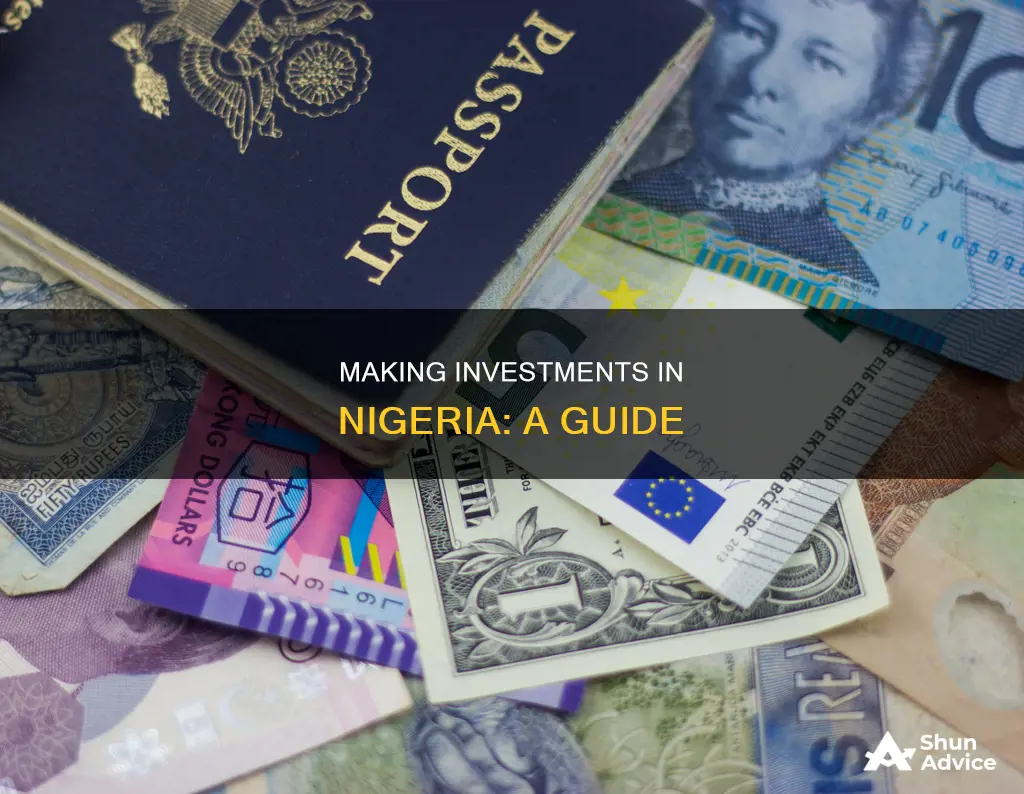
Investing in Nigeria has become more accessible to the average Nigerian due to the country's fast-growing fintech sector. With the right tools and knowledge, Nigerians can now easily invest in stocks, bonds, mutual funds, and cryptocurrency.
Nigeria is one of Africa's most attractive investment destinations, with a diverse range of natural resources and human capital. The country's real estate industry, for example, offers enormous investment potential due to its growing population and housing demand. The tech industry is also growing, with numerous startups receiving significant investments.
There are several investment vehicles available in Nigeria, including stocks, bonds, mutual funds, and real estate. It is important for investors to do their research and understand the economic environment and their own investment goals before committing their money.
This introduction will cover the basics of investing in Nigeria, including the different types of investments available, the benefits and risks involved, and the steps to take to start investing.
| Characteristics | Values |
|---|---|
| Economy | Africa's second-largest in 2023 |
| Investment Opportunities | Real estate, small and medium-scale enterprises, technology, agriculture |
| Investment Incentives | Tax holidays, non-tax incentives, enhanced exchange rates, loans, grants |
| Investment Types | Stocks, bonds, mutual funds, real estate, treasury bills, fixed deposits, equity, commercial papers, USD bonds |
| Investment Platforms | Bamboo, Chaka, Risevest, PiggyVest, Trove Finance, Cowrywise, Quidax, i-invest, GetEquity, Crowdyvest |
| Regulatory Bodies | Securities and Exchange Commission, Corporate Affairs Commission, Nigerian Investment Promotion Commission, Central Bank of Nigeria |
What You'll Learn

Understanding the economic environment and key sectors
Nigeria is one of the fastest-growing economies in Africa and was proclaimed the largest economy in Africa in 2014, with a GDP of over $510 billion. The country has a diverse range of natural resources and a large human capital base, with trained professionals available at competitive costs. The Nigerian government has also implemented various investment incentives to attract foreign investors.
The country's real GDP growth was 2.9% in 2023, according to the IMF, and the IMF forecasts a growth rate of about 3.3% in 2024, while the Nigerian government predicts a more robust 3.8% growth rate for the same year. Inflation reached a 28-year high of 28.9% in December 2023, driven mainly by rising energy prices and food costs. Nigeria's poverty levels have worsened, with the poverty rate growing from 44% in 2021 to 46% in 2023, according to the World Bank.
Nigeria's trade regime is protectionist in key areas, with high tariffs and prohibitions on many import items to spur domestic agricultural and manufacturing sector growth. The government provides tax incentives and customs duty exemptions for pioneer industries, including renewable energy. The country's underdeveloped power sector is a bottleneck for broad-based economic development, forcing businesses to generate their electricity. Reform in this sector is ongoing but is hampered by regulatory uncertainty, deficient infrastructure, government subsidies, and limited domestic natural gas supply.
Security is a concern for investors due to violent crime, kidnappings, and terrorism in certain parts of the country. The Boko Haram and Islamic State in West Africa (ISIS-WA) insurgencies have included attacks on civilian and military targets in the northeast. Additionally, there has been a rise in kidnappings for ransom and attacks on villages by armed gangs in the North-West and North-Central regions.
The Nigerian government has implemented economic reforms, including liberalising the foreign exchange market and clearing over $4 billion in foreign exchange backlogs. The government has also removed a costly fuel subsidy, which cost over $10 billion annually. These actions are expected to improve foreign currency inflows and investments, create jobs, lower inflation, and produce more robust economic growth in the medium to long term.
Key sectors for investment in Nigeria include:
- Real estate: The country's growing population and housing demand make this sector attractive, with high returns on investment.
- Small and Medium-Scale Enterprises (SMEs): SMEs make up 96% of businesses and 84% of employment in Nigeria, offering opportunities for investors to support local businesses while also making a profit.
- Technology: The tech industry has grown significantly in recent years, with numerous startups receiving investments from domestic and foreign investors. The industry has access to a vast talent pool and favourable policies that position it for exponential growth.
- Agriculture: The agricultural sector is the country's largest employer and contributes significantly to its GDP. The sector has enormous potential for growth, given the country's vast arable land and favourable weather conditions.
The Key Traits of Successful Investment Managers
You may want to see also

Exploring investment platforms and options
Nigeria has a wide range of investment platforms and options available to both domestic and foreign investors. Here is an overview of some of the key platforms and options to consider when investing in Nigeria:
Nigerian Stock Exchange (NGX)
The Nigerian Stock Exchange, now known as the NGX, is the primary stock exchange in the country. It offers investors the opportunity to buy and sell shares of publicly listed companies across various sectors. Through the NGX, investors can access a diverse range of investment options, including stocks, bonds, and mutual funds. The exchange provides real-time market data and news updates to help investors make informed decisions.
Bamboo
Bamboo is a popular investment platform that allows Nigerians to invest in both the United States and Nigerian stocks. The Bamboo app offers an easy and accessible way to buy, hold, or sell stocks on the Nigerian Stock Exchange (NGX) and US stock exchanges (NASDAQ and NYSE). It is regulated by the Securities and Exchange Commission (SEC) and offers features such as fractional shares and a US Wallet feature, which allows users to hold funds in USD until they are ready to invest.
Chaka
Chaka is another platform that provides access to foreign and Nigerian stocks, with over 4,000 investment options. It is also regulated by the SEC and allows users to open dollar and naira accounts, making it convenient for managing investments in different currencies. Chaka offers a "Knowledge Base" feature to educate users, but it does not provide investment recommendations.
Risevest
Risevest is a Nigerian fintech company that acts as a dollar asset manager. It offers a unique approach to investing by providing managed portfolios in sectors like US real estate, US stocks, and fixed-income assets. Risevest is ideal for passive investors who prefer to entrust their funds to professionals, as each portfolio is managed according to specific investment goals.
PiggyVest
PiggyVest is a platform that combines investing and saving. It offers various savings options, such as PiggyBank, Flex Dollar, SafeLock, Target Savings, and HouseMoney. Additionally, it provides access to investment opportunities in real estate and bonds, with a low minimum investment amount of ₦5,000. PiggyVest is known for its user-friendly interface and financial discipline tools, making it a popular choice for beginners.
Trove Finance
Trove Finance stands out for its diverse investment offerings, including over 10,000 Nigerian and foreign stocks, ETFs, bonds, and cryptocurrencies. This platform caters to investors seeking a mix of traditional and digital assets, all accessible through a single app. Trove Finance also offers features like Trove Social, a community for stock investors, and Earn by Trove, a fixed-income option.
Cowrywise
Cowrywise is a digital-first wealth management platform that focuses on providing access to savings and investment opportunities, particularly in mutual funds. It is licensed by the SEC and offers low-risk, medium-risk, and high-risk investment plans to suit different investor needs. Cowrywise also has a unique feature called "investment circles," which allows users to save and invest with friends and family.
Quidax
Quidax is a user-friendly cryptocurrency platform designed for Nigerians interested in investing in digital currencies. It offers a straightforward interface for buying, selling, and storing various cryptocurrencies at competitive rates. Quidax provides a secure wallet feature, allowing users to safely store their crypto assets and track their portfolio in real time.
I-invest
I-invest is a digital platform that offers a range of investment options, including treasury bills, fixed deposits, equity or stock investments, commercial papers, and USD bonds. It is regulated by the SEC and provides a safe and secure way to manage and grow your money. i-invest also offers informative investment tips and a flexible lineup of investment choices.
Real Estate
Nigeria's real estate industry presents significant investment potential due to the country's growing population and housing demand. Investors can explore opportunities in residential, commercial, and mixed-use properties, with the potential for high returns. Lagos, for example, offers investment plans with annualized yields of 10% and capital gains of 10% to 20% over two to four years.
Small and Medium-Scale Enterprises (SMEs)
Investing in SMEs is a way to support local businesses while also seeking profits. This can be done through equity financing, by purchasing shares in an SME, or debt financing, by providing a loan to the SME. Crowdfunding platforms also offer another avenue for investing in SMEs. The National Bureau of Statistics reports that SMEs make up 96% of businesses and 84% of employment in Nigeria, highlighting their significance in the economy.
Technology Startups
Nigeria's technology industry has experienced rapid growth, with numerous startups attracting investments from domestic and foreign investors. The country has a growing pool of tech talent and favourable policies that position the industry for exponential growth. Investing in tech startups typically involves providing seed funding or venture capital, and interested investors can do so through venture capital firms, angel investor networks, or direct investments.
Agriculture
With its vast arable land and favourable weather conditions, Nigeria's agricultural sector offers numerous investment opportunities. Investors can explore exporting agricultural products, investing in agro-processing ventures, or leasing land to farmers. Rice, cassava, plantain, poultry, and catfish farming are some of the areas with attractive expected returns.
Key Considerations
When exploring investment platforms and options in Nigeria, it is essential to consider the following factors:
- Security and regulation: Ensure that the platform is secure and registered with relevant regulatory authorities like the SEC and CBN.
- Fees: Review the transaction, management, and withdrawal charges, as these can impact your investment returns.
- User-friendliness: Look for platforms with intuitive interfaces and reliable customer support, especially if you are a beginner.
- Diversification: Choose platforms that offer a range of asset types, such as stocks, bonds, mutual funds, or cryptocurrencies, to diversify your investment portfolio.
Testing Your Investment Portfolio: Strategies for Success
You may want to see also

The role of financial advisors
Financial advisors play a crucial role in helping individuals navigate the complex world of investing, especially in a dynamic market like Nigeria. Here are some key aspects of their role:
Expert Guidance
Financial advisors are well-versed in the ins and outs of the Nigerian investment landscape. They can provide valuable insights into the various investment opportunities available, such as stocks, bonds, mutual funds, real estate, and more. This guidance is essential for investors, especially those new to the market, to make informed decisions.
Risk Management
A critical aspect of a financial advisor's role is helping clients understand and manage risk. By assessing an individual's financial goals, risk tolerance, and investment horizon, advisors can create a diversified portfolio that spreads risk and maximizes the potential for success. This diversification is crucial in an unpredictable economic climate.
Regulatory Compliance
Nigeria has specific regulations and requirements for investors, and financial advisors ensure their clients are compliant. They guide investors through the necessary registration processes, ensuring that all investments are made within the boundaries set by relevant authorities like the Securities and Exchange Commission (SEC) and the Corporate Affairs Commission (CAC).
Market Analysis
Financial advisors closely monitor the market, tracking performance and identifying trends. They can provide valuable insights into the best times to buy or sell investments, helping their clients maximize returns and minimize losses. This proactive approach is essential for long-term success.
Portfolio Management
Advisors work with clients to create and maintain a portfolio that aligns with their financial goals. They provide ongoing support, making adjustments as needed based on market conditions and the client's evolving needs. This includes helping investors take advantage of new opportunities and knowing when to sell underperforming assets.
Education
Financial advisors empower their clients by educating them about investing. They explain complex financial concepts, helping individuals understand how different investments work and the risks and rewards associated with them. This knowledge enables clients to make more informed decisions and feel more confident in their financial choices.
In summary, financial advisors are invaluable partners for anyone looking to invest in Nigeria. They provide guidance, expertise, and support, helping investors navigate the complexities of the market while striving to achieve their financial goals. By working with a financial advisor, individuals can make more strategic decisions, manage risk effectively, and ultimately improve their chances of investment success in Nigeria's dynamic economy.
Invest in Her to Get Her to Invest More
You may want to see also

The importance of diversification
Diversification is a key aspect of investing, and it's especially important when considering investment opportunities in Nigeria. Here are some reasons why diversification is crucial:
Risk Management:
By diversifying your investments across different asset classes, sectors, and regions, you reduce the risk of losing all your money if one particular investment or market performs poorly. For example, if you invest all your money in stocks and the stock market takes a downturn, you could lose a significant portion of your wealth. However, if you diversify by also investing in bonds, real estate, or other alternative investments, you're less likely to be severely affected by stock market volatility.
Maximizing Returns:
Different investments perform differently over time. By diversifying your portfolio, you increase the chances of having investments that perform well and generate strong returns. For instance, if you invest in both stocks and bonds, you can benefit from the higher potential returns of stocks during bullish markets, while the more stable bonds can provide a hedge against losses during bearish markets.
Long-Term Wealth Accumulation:
Diversification is a long-term strategy that helps build and preserve wealth. By spreading your investments across various asset classes, you can take advantage of compound growth over time. This means that the returns generated by your investments will themselves generate further returns, leading to exponential growth in your portfolio.
Mitigating Country-Specific Risks:
Investing in a single country, including Nigeria, carries specific risks associated with that country's economy, political environment, and regulatory framework. By diversifying across multiple countries, you reduce the impact of country-specific risks on your portfolio. For example, investing in both Nigerian and foreign stocks through platforms like Bamboo or Chaka can provide a hedge against currency fluctuations and protect your portfolio from being solely dependent on the performance of the Naira.
Matching Your Risk Tolerance:
Diversification allows you to tailor your investment portfolio to match your risk tolerance and financial goals. If you are a conservative investor, you may want to allocate more of your portfolio to less risky assets like bonds or treasury bills. On the other hand, if you have a higher risk appetite, you can allocate more towards stocks or even venture capital investments in tech startups.
Access to Global Opportunities:
Diversification allows you to access a wider range of investment opportunities globally. For instance, investing in foreign stocks or mutual funds can give you exposure to companies and industries that may not be available in the Nigerian market. This enables you to benefit from economic growth and innovation happening worldwide, rather than being limited to domestic opportunities.
In conclusion, diversification is a critical aspect of investing in Nigeria or anywhere else. It helps manage risk, maximize returns, and build wealth over the long term. By diversifying your investments, you can better navigate market fluctuations, protect your capital, and increase your chances of achieving your financial goals.
Understanding the Private Equity Investment Cycle
You may want to see also

Regulatory considerations and investor protection
The Nigerian Investment Promotion Commission (NIPC) Act of 1995, amended in 2004, liberalized controls and limits on FDI, allowing for 100% foreign ownership in all sectors, except those prohibited by law for both local and foreign entities. These include arms and ammunition, narcotics, and military apparel. In practice, however, some regulators include a domestic equity requirement before granting foreign firms an operational license. The NIPC Act also guarantees investors the unrestricted transfer of dividends abroad (net a 10% withholding tax).
The NIPC Act prohibits the nationalization or expropriation of foreign enterprises except in the case of national interest or for a public purpose. In such cases, investors are entitled to fair compensation and legal redress. The NIPC Act also provides modalities for "fair and adequate" compensation in the case of compulsory dispossession of an investor's interest in a company.
The NIPC Act further stipulates that in the event of a dispute between an investor and the government, all efforts should be made to reach an amicable settlement through mutual discussion. If this fails, the dispute may be submitted to arbitration, either in accordance with the rules of procedure for arbitration specified in the Arbitration and Conciliation Act or within the framework of any bilateral or multilateral agreement on investment protection to which the Nigerian government is a party.
The Investment and Securities Act of 2007 forbids monopolies, insider trading, and unfair practices in securities dealings. It also empowers the Securities and Exchange Commission (SEC) to regulate investments and maintain a register of foreign portfolio investments.
The Federal Competition and Consumer Protection (FCCPC) Act, enacted in 2019, prohibits agreements made to restrain competition, such as price-fixing, collusive tendering, and price-rigging. It also empowers the President of Nigeria to regulate the prices of certain goods and services. The Act prescribes stringent fines for non-compliance, including a fine of up to 10% of the company's annual turnover in the preceding business year.
The Nigerian legal system, a complex combination of English common law, Islamic law, and Nigerian customary law, is susceptible to pressure from the executive and legislative branches. While the constitution and law provide for an independent judiciary, political leaders have been known to influence the judiciary, particularly at the state and local levels.
The NIPC Act of 1995, amended in 2004, liberalized Nigeria's foreign investment regime, facilitating access to credit from domestic financial institutions. The Central Bank of Nigeria (CBN) has also sought to diversify foreign exchange inflows by encouraging foreign investments.
The Nigerian Securities and Exchange Commission (SEC) is the government agency tasked with regulating and developing the capital market. It creates operational guidelines and licenses securities and market intermediaries.
The Nigerian government employs debt instruments such as treasury bills of one year or less and bonds of various maturities ranging from two to 30 years. Nigeria is increasingly relying on the domestic bond market to finance its widening deficit.
The Nigerian government provides oversight relating to competition, consumer rights, and environmental protection issues. The Federal Competition and Consumer Protection Commission (FCCPC), the National Agency for Food and Drug Administration and Control, the Standards Organisation of Nigeria, and other entities have the authority to impose fines and ensure the destruction of harmful substances.
The Nigerian government recognizes secured interests in property, such as mortgages. However, the recording of security instruments and their enforcement remain subject to the same inefficiencies as those in the judicial system.
The Nigerian government has privatized many former state-owned enterprises (SOEs) to encourage more efficient operations. The Privatization and Commercialization Act of 1999 established the National Council on Privatization and the Bureau of Public Enterprises (BPE) to oversee and implement designated privatizations.
The Nigerian government has no specific action plan regarding OECD Responsible Business Conduct guidelines. However, several legislative acts incorporate provisions that directly or indirectly regulate the observance or practice of corporate social responsibility.
Investor Protection
The NIPC Act of 1995 provides solid assurances regarding the protection of investments. It guards against nationalization or expropriation of enterprises by the government and the compulsory dispossession of investors. It also allows for the repatriation of proceeds in convertible currency, where applicable.
The NIPC Act further stipulates that in the event of a dispute between an investor and the government, all efforts should be made to reach an amicable settlement through mutual discussion. If this fails, the dispute may be submitted to arbitration, providing investors with access to legal recourse.
The Investment and Securities Act of 2007 forbids monopolies, insider trading, and unfair practices in securities dealings, offering further protection to investors.
The Federal Competition and Consumer Protection (FCCPC) Act, enacted in 2019, prohibits anti-competitive practices such as price-fixing and collusive tendering, ensuring a fair marketplace for investors.
The Nigerian government recognizes secured interests in property, such as mortgages, providing a degree of protection for investors.
The privatization of state-owned enterprises has also opened up new investment opportunities for foreign investors, who can participate in the BPE's privatization process.
While Nigeria offers a range of lucrative investment opportunities, it is important for investors to carefully consider the regulatory environment and protections in place. The NIPC Act of 1995 and the Investment and Securities Act of 2007 provide a strong foundation for investor protection, and the presence of government agencies like the SEC and FCCPC further enhance the investment landscape. However, investors should also be aware of the complexities of the Nigerian legal system and the potential for political influence.
Investment Managers: Tracking New Prospects for Success
You may want to see also
Frequently asked questions
There are several types of investments available in Nigeria, including stocks, bonds, mutual funds, real estate, hedge funds, private equity, venture capital, and infrastructure funds.
Some of the best investment platforms in Nigeria include Bamboo, Chaka, Risevest, PiggyVest, Trove Finance, Cowrywise, Quidax, i-invest, and GetEquity.
Investing in Nigeria offers the potential for high returns, a diverse range of investment opportunities, and a large pool of human capital. Additionally, the country's fast-growing fintech sector has made investing more accessible to Nigerians of various socioeconomic backgrounds and experience levels.
When choosing an investment platform in Nigeria, it is important to consider factors such as security, fees, user experience, and the range of investment options available. It is also crucial to ensure that the platform is registered with relevant financial authorities, such as the Securities and Exchange Commission (SEC) and the Central Bank of Nigeria (CBN).







